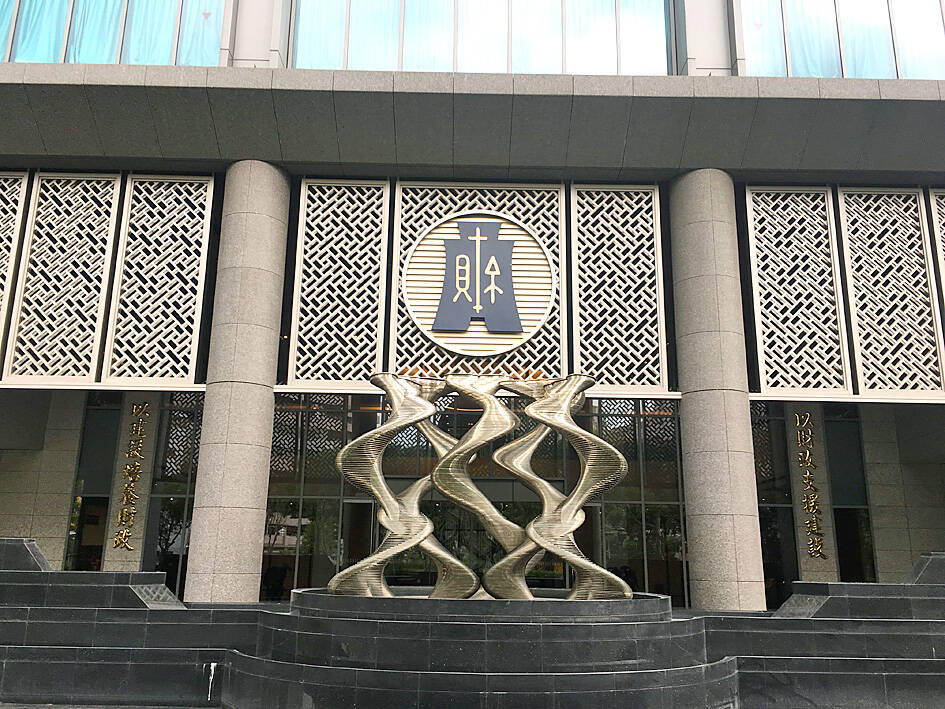Tax revenue last year increased 7.9 percent from a year earlier to NT$3.73 trillion (US$112.62 billion), exceeding the government’s budget target by NT$497.2 billion, aided by hefty gains in securities transaction, personal income and business tax revenues, the Ministry of Finance said yesterday.
The real surplus could reach NT$510 billion if late payments are added in, ministry statistician Liu Shun-rong (劉訓蓉) told an online media briefing, adding that it is the fourth consecutive year that revenues exceeded the official target.
Revenue from securities transaction taxes amounted to NT$288 billion, spiking 46 percent from one year earlier, as average daily turnover swelled 42.6 percent to NT$477.4 billion, Liu said.

Photo: Clare Cheng, Taipei Times
“The sharp rise came from fund flows to the local bourse to take advantage of the artificial intelligence-stock fever,” Liu said.
The TAIEX rallied 28.47 percent last year, second only to the US’ tech-heavy NASDAQ’s 29.81 percent gain, she said.
Corporate income tax revenue grew 3.6 percent to NT$1.12 trillion even though non-tech firms took a hard hit from a lingering global economic slowdown and overproduction from Chinese peers, Liu said, attributing the small increase to a relatively low base in 2023 due to profit declines and temporary tax relief measures.
Revenue from personal income tax expanded 8.9 percent to NT$822.2 billion, aided by higher cash dividends and capital gains from property transfers, she said.
The first half of last year saw a bullish housing market, propelled by favorable lending terms for first-home purchases. The trend boosted housing loans near a record-high in August, prompting the central bank to expand credit controls in September to pre-empt what it called a repeat of the housing bubble bust seen in the US in 2008.
Revenue from land value increase tax upon resale of real-
estate properties gained 5.3 percent to NT$99 billion, the ministry reported.
Business tax revenue expanded 6.4 percent to NT$608.9 billion, as domestic banks benefitted from interest rate hikes, while local suppliers of electronic components reaped a windfall from active investment in artificial intelligence by US cloud service providers, it said.
Additionally, revenue from entertainment tax grew more than two-fold, as Taiwanese packed major music concerts and sports events, Liu said.

Vincent Wei led fellow Singaporean farmers around an empty Malaysian plot, laying out plans for a greenhouse and rows of leafy vegetables. What he pitched was not just space for crops, but a lifeline for growers struggling to make ends meet in a city-state with high prices and little vacant land. The future agriculture hub is part of a joint special economic zone launched last year by the two neighbors, expected to cost US$123 million and produce 10,000 tonnes of fresh produce annually. It is attracting Singaporean farmers with promises of cheaper land, labor and energy just over the border.

US actor Matthew McConaughey has filed recordings of his image and voice with US patent authorities to protect them from unauthorized usage by artificial intelligence (AI) platforms, a representative said earlier this week. Several video clips and audio recordings were registered by the commercial arm of the Just Keep Livin’ Foundation, a non-profit created by the Oscar-winning actor and his wife, Camila, according to the US Patent and Trademark Office database. Many artists are increasingly concerned about the uncontrolled use of their image via generative AI since the rollout of ChatGPT and other AI-powered tools. Several US states have adopted

A proposed billionaires’ tax in California has ignited a political uproar in Silicon Valley, with tech titans threatening to leave the state while California Governor Gavin Newsom of the Democratic Party maneuvers to defeat a levy that he fears would lead to an exodus of wealth. A technology mecca, California has more billionaires than any other US state — a few hundred, by some estimates. About half its personal income tax revenue, a financial backbone in the nearly US$350 billion budget, comes from the top 1 percent of earners. A large healthcare union is attempting to place a proposal before

KEEPING UP: The acquisition of a cleanroom in Taiwan would enable Micron to increase production in a market where demand continues to outpace supply, a Micron official said Micron Technology Inc has signed a letter of intent to buy a fabrication site in Taiwan from Powerchip Semiconductor Manufacturing Corp (力積電) for US$1.8 billion to expand its production of memory chips. Micron would take control of the P5 site in Miaoli County’s Tongluo Township (銅鑼) and plans to ramp up DRAM production in phases after the transaction closes in the second quarter, the company said in a statement on Saturday. The acquisition includes an existing 12 inch fab cleanroom of 27,871m2 and would further position Micron to address growing global demand for memory solutions, the company said. Micron expects the transaction to